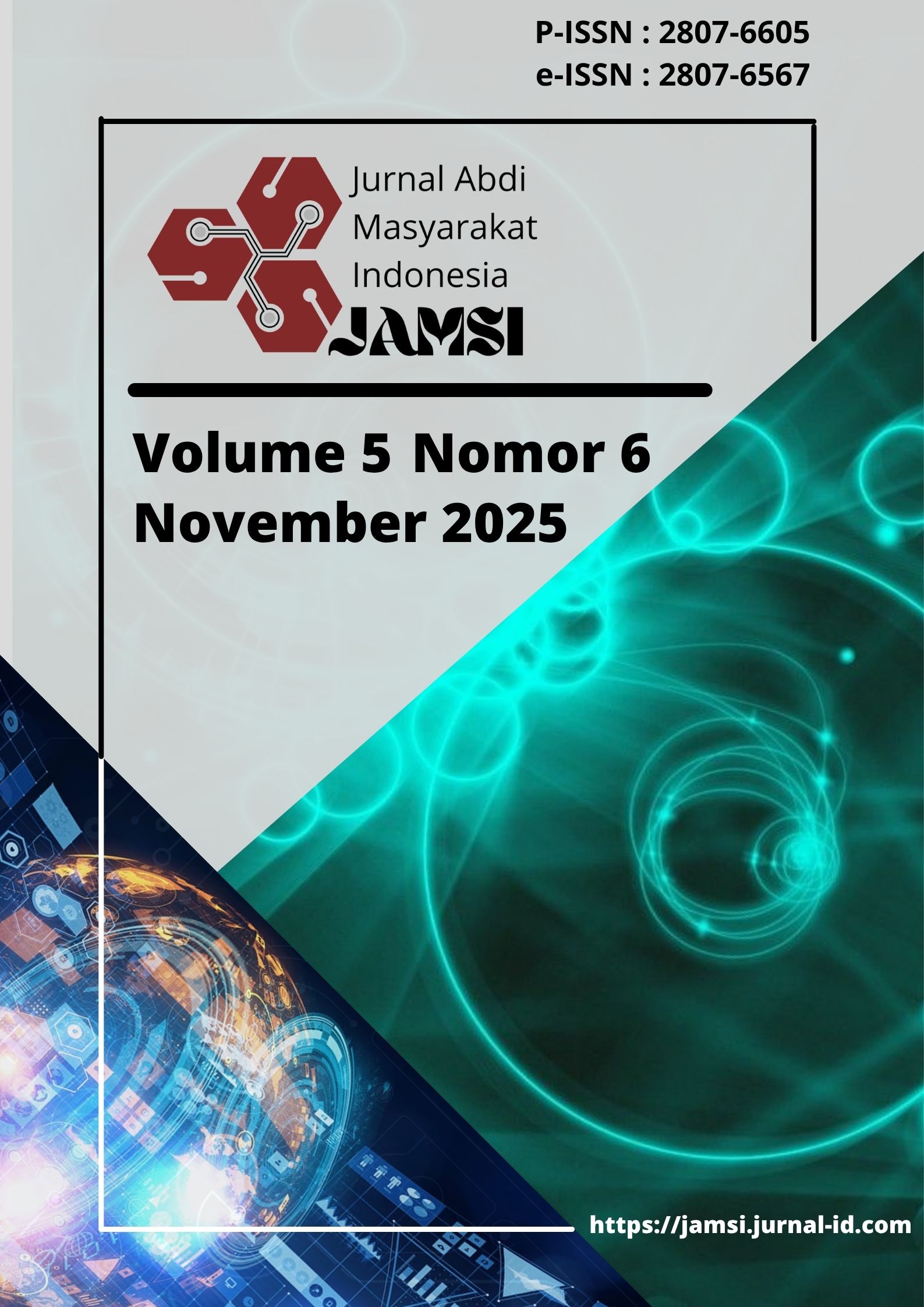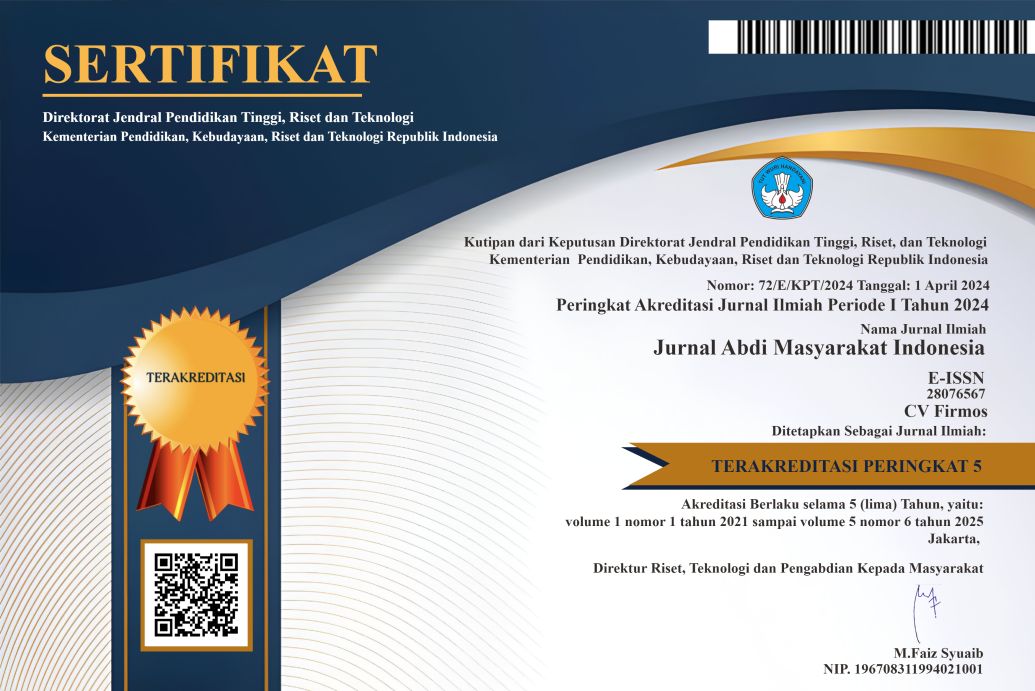Pelatihan Pembelajaran Sains dengan Pendekatan Investigative Science Learning Environment (ISLE) bagi Guru Sekolah Dasar di SD Yohannes Gabriel Surabaya
DOI:
https://doi.org/10.54082/jamsi.2235Kata Kunci:
Environmental Literacy, ISLE, Primary School Teacher, Science Learning, Teacher TrainingAbstrak
Science education in primary schools has an important role in fostering scientific attitudes and environmental literacy. This community service program aims to improve the quality of science learning in elementary schools through the application of the Investigative Science Learning Environment (ISLE) approach integrated with environmental literacy. The activities were carried out at Yohannes Gabriel Elementary School in Surabaya through several stages: preparation, socialization, training, implementation assistance, and evaluation. There were 10 teachers participating in this training. Teachers were trained to understand the concept of ISLE, to integrate environmental issues into science learning, and to design contextual and engaging teaching media. The evaluation results after the training showed an increase in teachers’ understanding of the ISLE approach with an N-gain score of 0.75. Once teachers understand ISLE, they will be able to develop active learning and apply it to their students. This collaboration also strengthens the partnership between higher education institutions and elementary schools in developing pedagogical innovations relevant to the challenges of 21st-century education.
Referensi
Brookes, D. T., Ektina, E., & Planinsic, G. (2020). Implementing an epistemologically authentic approach to student-centered inquiry learning. Physical Review Physics Education Research, 16(2), 020148.
Buggé, D., & Etkina, E. (2020, October). The long-term effects of learning in an ISLE approach classroom. In Physics Education Research Conference (pp. 63-68).
Dariansyah, J., Sumianto, S., Alim, M. L., Fauziddin, M., & Hardi, V. A. (2023). Peningkatan Keterampilan Proses Sains Siswa Sekolah Dasar melalui Model Pembelajaran Berbasis Masalah. Jurnal Pendidikan MIPA, 13(4), 939-946.
Etkina, E., Murthy, S., & Zou, X. (2006). Using introductory labs to engage students in experimental design. American journal of Physics, 74(11), 979-986.
Etkina, E., Brookes, D. T., & Planinsic, G. (2021, May). The investigative science learning environment (ISLE) approach to learning physics. In Journal of Physics: Conference Series (Vol. 1882, No. 1, p. 012001). IOP Publishing.
Etkina, E., & Planinsic, G. (2024). The investigative science learning environment: A guide for teacher preparation and professional development. IOP Publishing.
Nisfa, N. L., & Putri, F. K. A. (2022). Pembelajaran sains inquiry pada anak usia dini. Tinta Emas: Jurnal Pendidikan Islam Anak Usia Dini, 1(1), 29-42.
Hake, R. R. (1998). Interactive-engagement versus traditional methods: A six-thousand-student survey of mechanics test data for introductory physics courses. American journal of Physics, 66(1), 64-74.
Herwinarso, Koswojo, J., & Pratidhina, E. (2023). Development of an Inquiry-Based Module with Scientific Equipment to Facilitate Primary School Students Learning the Force Concept. Journal of Education and e-Learning Research, 10(2), 314-322.
Karelina, A., & Etkina, E. (2007). Acting like a physicist: Student approach study to experimental design. Physical Review Special Topics— Physics Education Research, 3(2), 020106.
Karina, M., Judijanto, L., Rukmini, A., Fauzi, M. S., & Arsyad, M. (2024). Pengaruh interaksi sosial terhadap prestasi akademik: tinjauan literatur pada pembelajaran kolaboratif. Innovative: Journal Of Social Science Research, 4(5), 6334-6343.
Kementerian Pendidikan, Kebudayaan, Riset, dan Teknologi, Badan Standar, Kurikulum, dan Asesmen Pendidikan. (2024). Keputusan Kepala Badan Standar, Kurikulum, dan Asesmen Pendidikan Nomor 032/H/KR/2024 tentang capaian pembelajaran pada pendidikan anak usia dini, jenjang pendidikan dasar, dan jenjang pendidikan menengah pada Kurikulum Merdeka. Kemendikbudristek (BSKAP). https://bskap.kemdikbud.go.id
Kusumaningrum, D. (2018). Literasi lingkungan dalam kurikulum 2013 dan pembelajaran IPA di SD. Indonesian Journal of Natural Science Education, 1(2), 57-64.
Ristiani, R., Ali, A., & Apriyanto, A. (2025). Konsep Dasar Pembelajaran IPA. PT. Sonpedia Publishing Indonesia.
Rutberg, J., Jammula, D., & Ahmed, S. (2023). Implementation of an investigative science learning environment based laboratory course taught by novice instructors. Physical Review Physics Education Research, 19(2), 020153.
Santoso, R., Roshayanti, F., & Siswanto, J. (2021). Analisis literasi lingkungan siswa SMP. JPPS (Jurnal Penelitian Pendidikan Sains), 10(2), 1976-1982.
Sawitri, A. D., Priyanti, P. W., Wanah, N., & Prayogo, M. S. (2024). Membangun Generasi Peduli Lingkungan: Analisis Literatur Pembelajaran Sains di Tingkat SD/MI. INKUIRI: Jurnal Pendidikan IPA, 13(1), 106-113.
Wahyuni, S., Halim, A., Evendi, E., Syukri, M., & Herliana, F. (2021). Pengembangan lembar kerja peserta didik (LKPD) berbasis pendekatan investigative science learning environment (ISLE) untuk meningkatkan keterampilan berpikir kreatif siswa. Jurnal Penelitian Pendidikan IPA, 7(SpecialIssue), 39-45.
Yolanda, A., Sihotang, M., Zebua, J. A., Hutasoit, M., & Sinaga, Y. L. (2024). Strategi Pembelajaran Kontekstual untuk Meningkatkan Pemahaman Konsep Siswa Sekolah Dasar. Pragmatik: Jurnal Rumpun Ilmu Bahasa Dan Pendidikan, 2(3), 301-308.
Unduhan
Diterbitkan
Cara Mengutip
Terbitan
Bagian
Lisensi
Hak Cipta (c) 2025 Elisabeth Pratidhina, Herwinarso Herwinarso, Retno Palupi, Siti Mina Tamah, Endra Putra Wibowo, Caroline Marcelinda

Artikel ini berlisensi Creative Commons Attribution 4.0 International License.


















